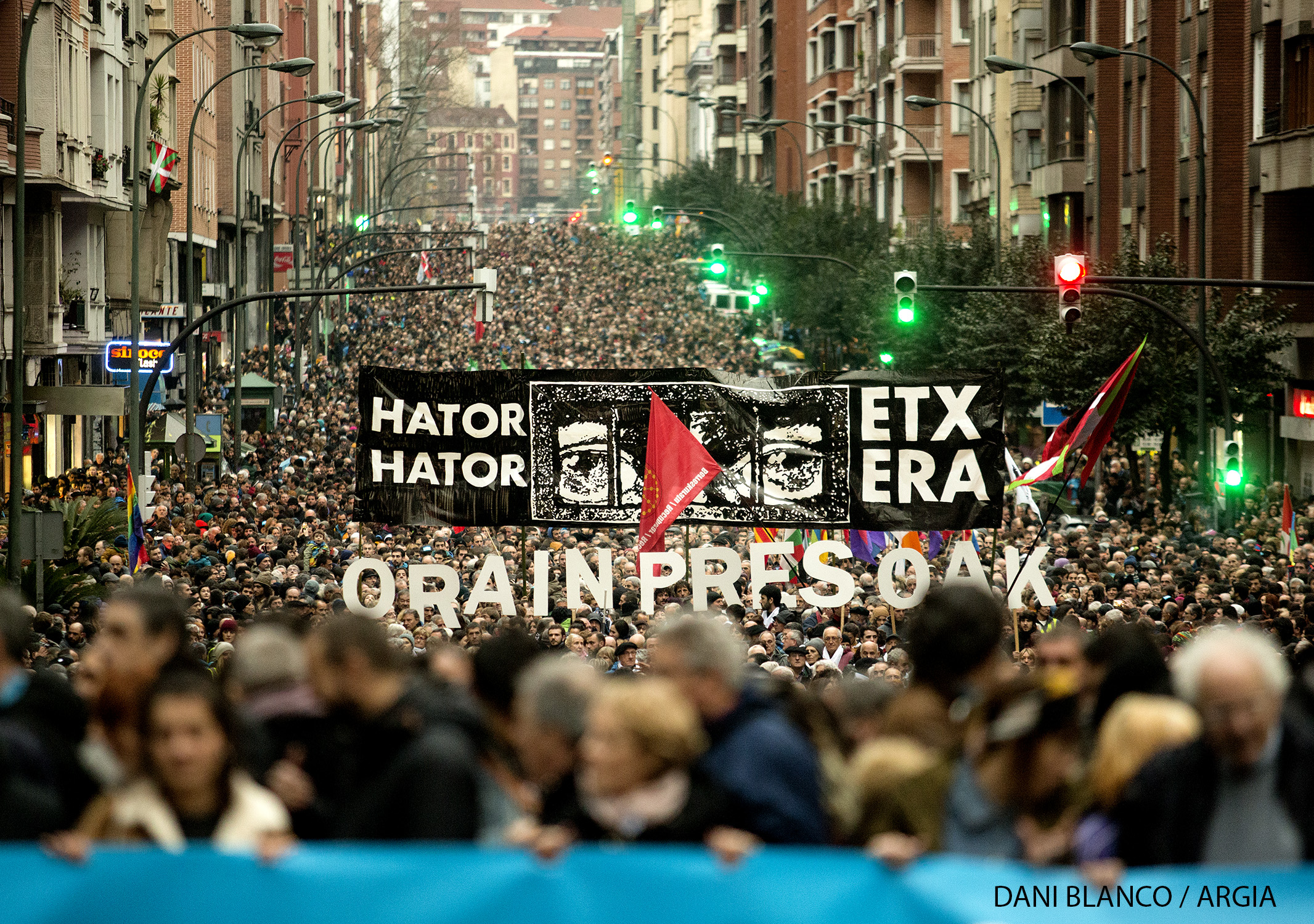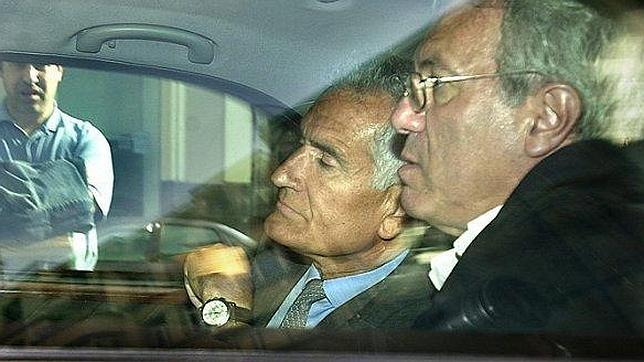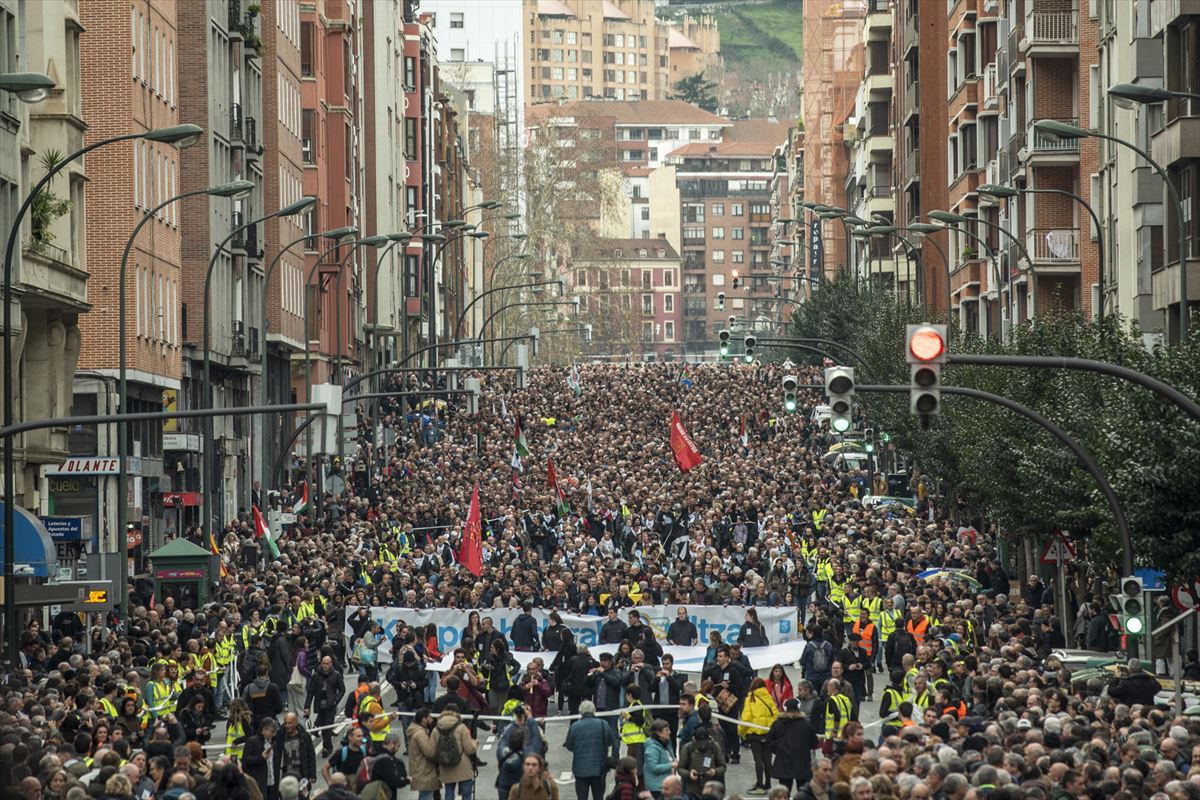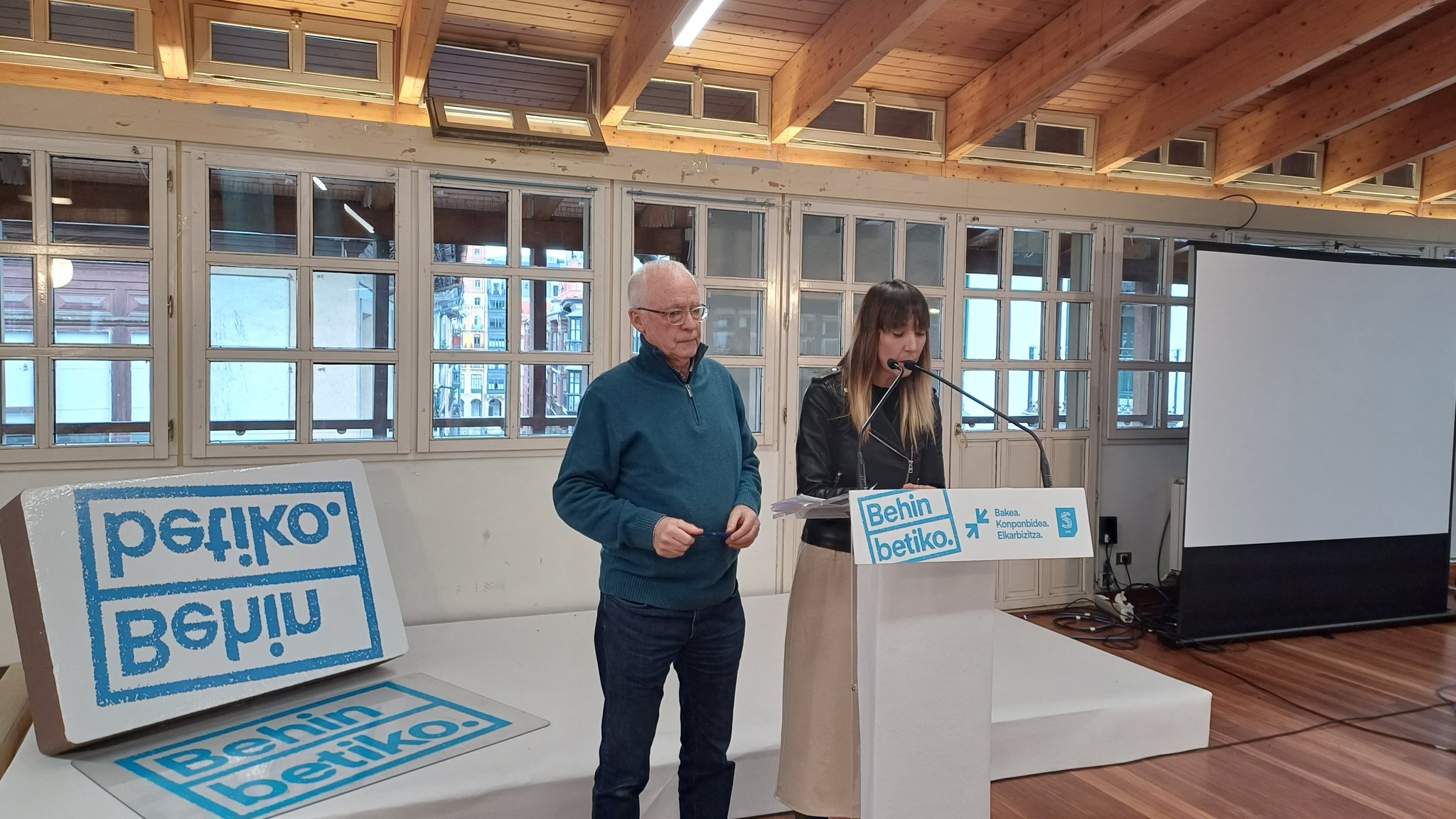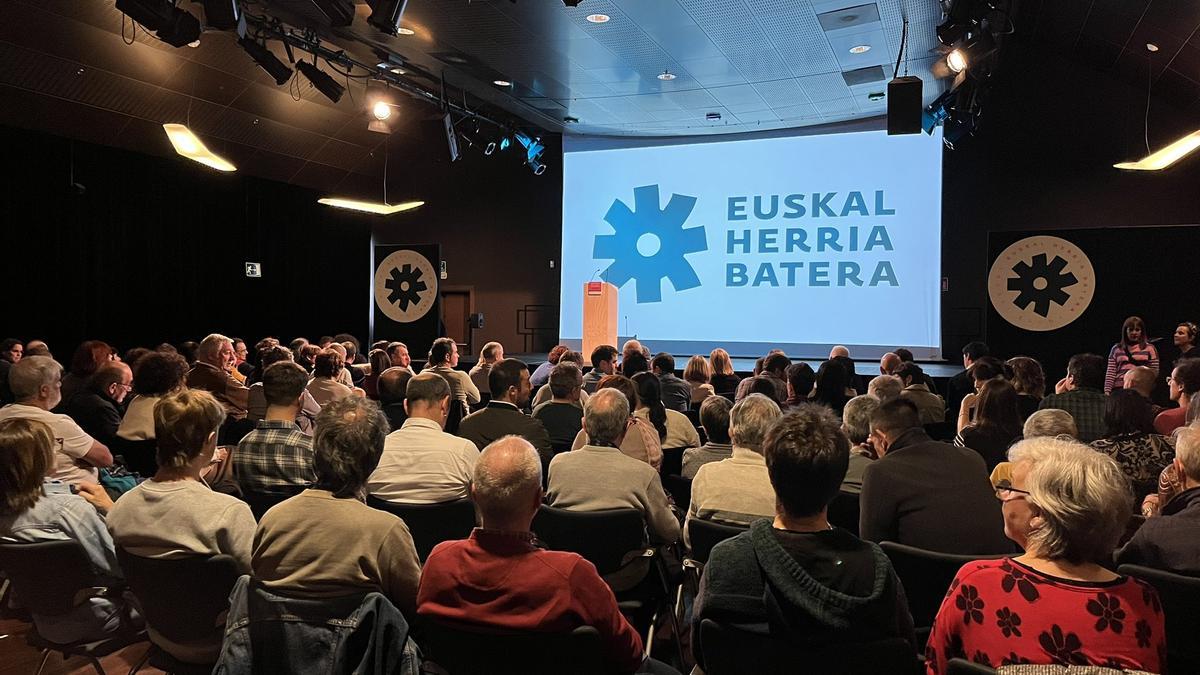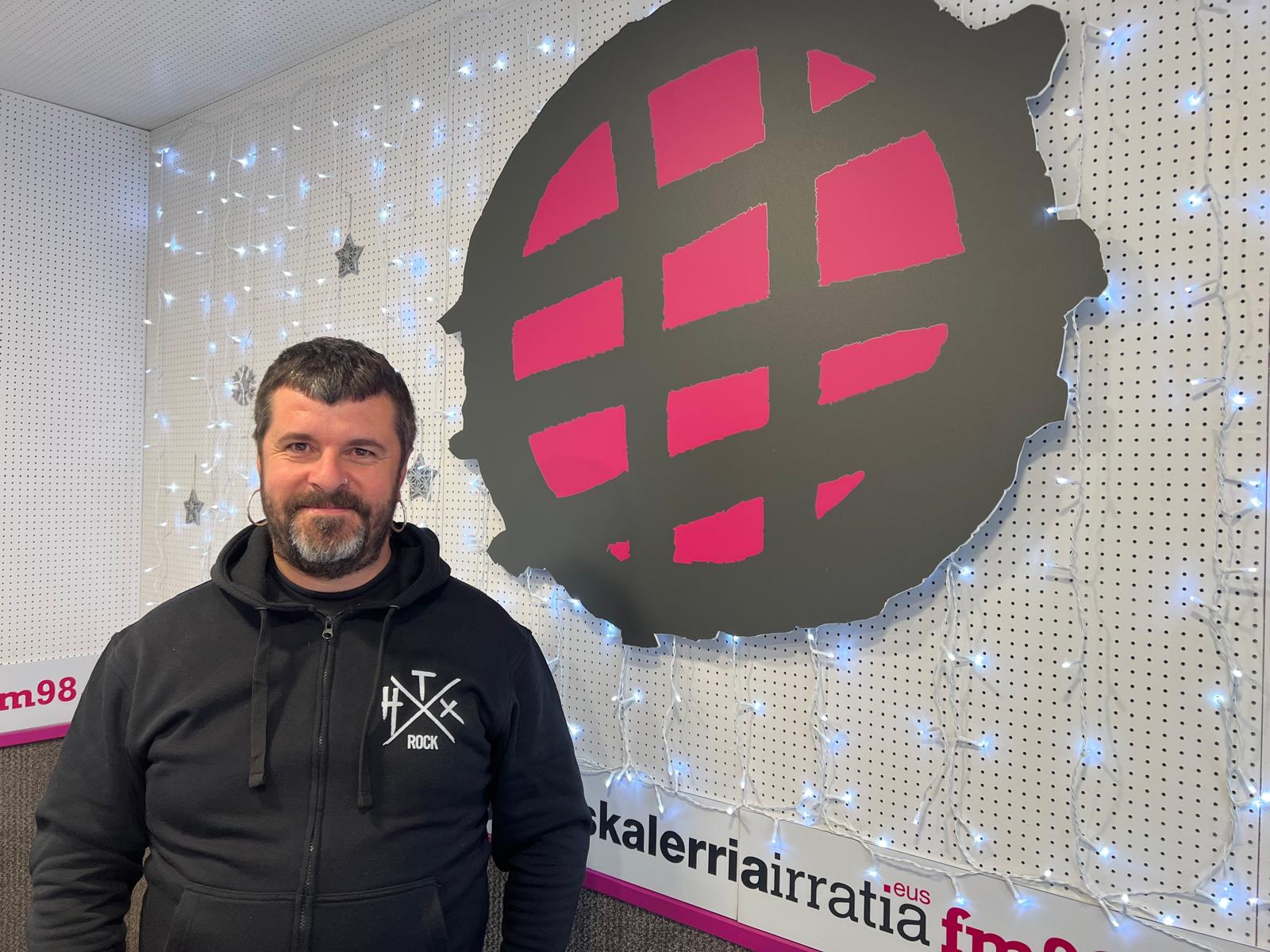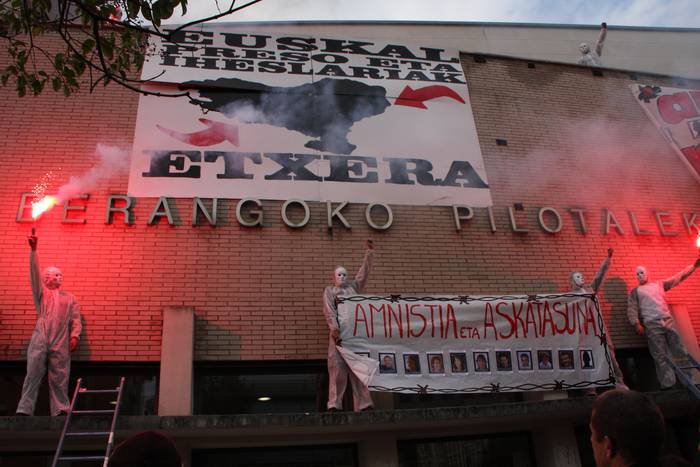"I want to defend the ethical and revolutionary dignity of the militants"
- Emilio López de Adam, Negro, was born in Vitoria in 1946. He started young at ETA and by the age of 20 he had responsibilities in the organization. He was also a director and was tried in absentia in the Pleito de Burgos. He left the organization in the mid-1970s. After fleeing from Hego Euskal Herria, he completed his medical studies in Brussels and later lived in Angelu to this day, dedicating himself professionally to gynecology. He has published numerous books, especially with Basque nationalism and the class perspective, and he is also the author of hundreds of articles, especially in the Basque press and many of them in ARGIA.
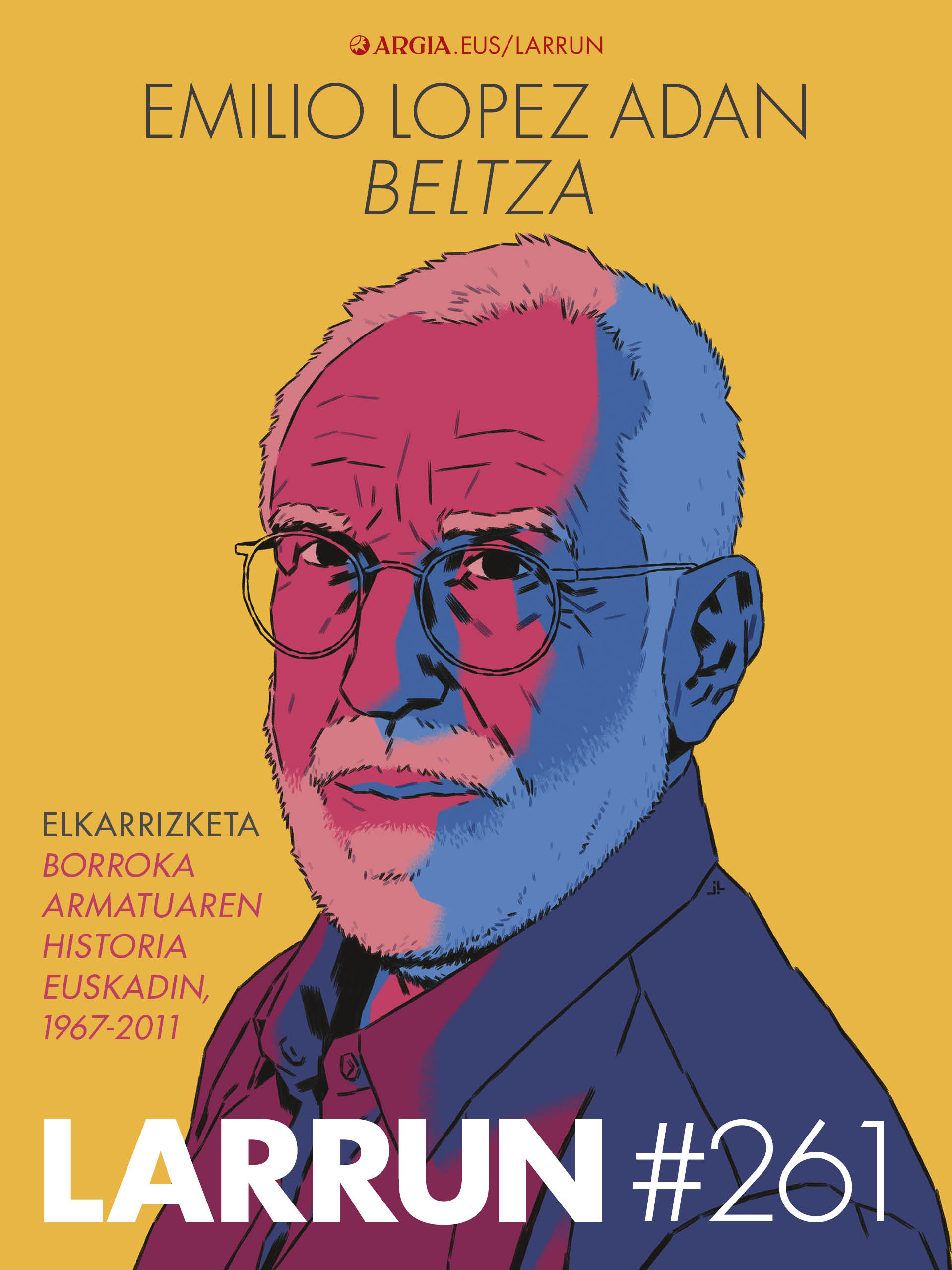
On March 3 he presented in Baiona the history of the Armed Struggle in the Basque Country. Book 1967-2011, research based on deaths in Basque conflict in the last 60 years. In fact, there are three volumes that analyze this broad period in three periods: the first explores the time of 1967-1980, the second 1981-1990 and the third 1991-2011. Located in libertarian positions, near the Autonomous Commands in the early 1980s, in the last three or four decades has been very critical with the armed action of ETA. He was also a militant of the Union of Basque Nationalists. Through this gigantic work, the author conducts a rigorous investigation of the armed struggle, critically analyzing the past and claiming the armed struggle and the dignity of all the militants who practice it.
What sources have you used?
First I've made a chronological list of deaths from armed groups and states. Then, in each case, I have used the texts of the time, what the media said, the explanations of the armed institutions or the states and the decisions of the courts, as well as the investigations into the facts that have subsequently appeared in books and fiction. As far as possible, I have also received testimonies from witnesses, and I have also interviewed many protagonists.
We must pay attention to the sources, because when the armed institutions or the states take on a fact, they cannot be thought to be 100%, because they are an interested party. If justice were impartial, the decisions of the courts should bring the truth, but in us justice has been absolutely partial, absolutely aggressive and sometimes the truth has been mistaken with a desire for revenge. Many of the subsequent work carried out by researchers is for political purposes and has often confused and misguided. And there are also problems with witnesses, because the memory is not that of the events of the time, but a elaboration that is then made to give meaning to their life. I therefore offer my interpretation.
It says that all research has its objectives and that care must be taken, that it must be taken into account. What are your goals?
I can't deny it, I also have my goals, and the result is conditioned on my personal history and my ideas. My thing is not the story that is made from the Tower of Boli, the story is involved. But having said that, I have dedicated all the material mentioned to the reader, with a critical perspective, so that he can make his own reading by saying what it is.
With regard to the objectives, I believe that there are two issues to be tackled. The first is the systematic condemnation of violence and the second is the hunger for revenge. I want to fight both of them. The State wants to decide today what has happened and says that violence is not allowed to change the current system. It has spread well the idea that violence to change political situations is never correct. In the end, the State's conclusion is that if the will of revolution is linked to armed struggle, that is always bad, in principle. Violence is illegitimate, it always entails unnecessary suffering, and in the end, if you win, it will always be worse. All this, however, is an ideological, debatable and to me false position, in order to defend the interests of the ruling classes and the State. What do these university students ask for? The truth about what happened? No. They need names to condemn and avenge people.
"My main objective is to remember what the facts were, the political reasons in which they were carried out and what the awareness and interpretation of the protagonists of the time have been to reclaim the dignity of these people again"
They are widely used concepts in conflict, truth and reparation.
They have brought out very strange theories about the victims, they need to know who their perpetrators are, especially to punish them well. But there are many people who deny the need for a punishment for the reparation of the victims. All the victims want to know what has happened, but that need for revenge is the political attitude used by the State. And today, in that attitude, there is a huge blockade to know the truth. 30% of ETA’s actions are not yet clarified, but the State does not encourage its clarification, let us say, with an amnesty that would lead to clarification of the facts. Amnesty would make it easier to talk about this and care for the victims. But if you say you have to know, for example, who killed Pertur [Eduardo Moreno Bergaretxe] and then goes to jail for 25 years, you are blocking clarification of the matter. They don't care about clarifying what happened.
And you also mentioned a second objective of the work.
It concerns this famous reconciliation. What is the goal, to say that everyone is a victim? Do ETA prisoners also, and therefore everyone, have the right to redress? It is not possible. The conflict is there. It has not been corrected yet, it has not been cured. History cannot reject the political and social reasons of the conflict on the road to reconciliation, because it denies knowing the true causes of the conflict, both the motivation of the authors and the reformulation of the dignity of the authors. My main objective is to remember what the facts were, the political reasons in which they were carried out, and what the conscience and interpretation of the protagonists of the time have been to re-assert the dignity of these people. Those people fought for freedom. What made mistakes? Our job is to clarify the mistakes and explain why they were wrong, but to reaffirm their dignity as activists.

Let’s go to the terminology used: in one of them action, then attack, terrorism… Why do you choose each?
It's been complicated. For example, some researchers at the UPV/EHU systematically use “terrorist”, preferably “blood” and “cowardly”, or always “murder”. These are not innocent choices. On the contrary, in the writings of the left Abertzale they are all “actions” and “entrepreneurs”, and the evil words will never be used to qualify an action of ETA. As a mark of respect, I have used the militant terminology of the Abertzale left: in most cases I say “action” and not “attack”, “kill” and not “murder”, “execution”… But I do not always, at certain times I make another choice, especially because many of the actions have been done out of what is permitted by traditional revolutionary ethics: kill those who are not involved in the repression, they do not defend, they do not make it.
You also analyze who is the target of the violence and make a classification based on it: directly involved, indirectly… and exclude the designation of victim.
Killing someone is very hard and, for example, if you were driving a bomb, it was hard to see how a body was fragmented, a hand here, a leg there… All the dead, in short, have been the victims of physical action. In view of this equality, is this concept, that of the physical victim, appropriate to understand the political struggle, the social struggle, the fight for freedom or, for example, the repression of the State, with different or opaque contents? Not applicable. If the investigation focuses on the victims, the whole story is reduced to violence, violence and the ugly history of blood. From this perspective, what is the point of the war against the Nazis, the struggle of the Republicans of the civil war or, among other things, the French Revolution? In any conflict it can be said that people have suffered intensely everywhere, or that “the victims have been on both sides”, “it was not worth it”… From this perspective, it may be said that people and the history of the world were not worth it… but when something has happened, if it makes sense, you have to look for that beyond the reality of the physical victim.
That does not mean that I have no respect for the victims, it is well understood how they have suffered. The next example can also be used to understand what I'm explaining. The biggest association of victims in the world is that of American soldiers killed or injured in the Vietnam War, genuine victims, but if you want to explain from this perspective the fight against colonialism, for national freedoms or for the communist revolution you have free time. Analyzing all this only from physical truthfulness has no explanation, it is barbaric. Does it still make sense to fight for freedom? Yes, and that is why we must go beyond the victim.
"Why did many people accept armed violence at one point? Not only was it necessary, not only legitimate, but also a moral obligation against repression”
Will you explain why you've done the death categories?
There is no doubt that the issue is complicated. In view of the actions of armed groups, the main criterion is whether or not the victim is involved in the repression. If the deceased is involved and has died in combat, that makes sense. About those not involved in repression... some would say “innocent victims”. So are the others guilty? We will always be told how many poor people have gone because I had no choice but the civil guard, but once they are involved in repression they are involved.
Other researchers investigate the “selectivity of the attack.” It seemed to me that, with a view to revolutionary ethics and strategy, actions against those involved in repression have a special meaning in the logic and strategy of the liberating struggle, and, conversely, when actions against those not involved or the collateral victims occur continuously and tolerated, they have another meaning.
There is also the complex issue of names. It speaks of many names, when the pain is still on the skin, of open judicial issues… Don’t you fear for their consequences?
It is a very sensitive issue. I have read to a number of people what I have written, I have also received opinions from former militants and from those who are still considered militants. Names are mentioned for one reason: if the evolutions in the armed organizations are not related to names, you cannot understand where you are talking. With some examples, we can better understand why names. If we ask, “Who made the decision to move the car bomb?” and the answer is “ETA”. Or, “and who was against that within ETA?” “some of ETA…”. That is not the way to know what has actually happened.
Throughout the history of the organization, national freedom and the social revolution entered ETA to fight for freedom. As a result, the militant has suffered brutal state repression, which responds with solidarity and unity. That unity of objectives has been maintained until the last moment, and that is why, for me, also in recent years, the people who entered into ETA at the time of the greatest nonsense deserve all respect, as those who entered at the beginning, because they have had those objectives and have made that commitment.
But there have also been fractures: many people have disagreed with the car bomb, with the “socialization of suffering” or with the expansion of the categories of objectives to fight many people. Within ETA many have said “that’s not right” and, in addition, “that’s going to harm us.” These kinds of debates had already begun in the 1970s and were opposed positions. How do you want to understand what was happening without associating those attitudes with concrete people? It is not possible. If we have to understand our history, we need names to follow up. And he who reads the book will see how names are repeated… Create it until it appears. Before the Algiers negotiations, some of these names and trends appear, and they continue to last all the time within ETA: Critic within an order [critical in order], willing to keep the Abertzale left without rupture, but willing to take the step so that one day the armed struggle ends... And those steps take place at various moments, in Algiers, in the Leizaran Agreement, at the birth of Sortu... and if he compares them… “to, in this debate there is continuity”.
Understanding history is -- but repression is also there.
All the names mentioned in the book are public, that is, they have been mentioned previously. They have been cited in the press, court rulings, fights, or memories; otherwise, no one is involved in any action. We do not want to open up any opportunity for repression, and that is why there are people who have read it and, as I wrote, have also suffered. It's not easy to read many things. Seeing the name of a person you know and respect attached to an ugly action is very hard.
"Although in this interview we have not talked much about
repression, I
want to emphasize that in the book repression occupies an important place and that the fraternity generated by repression is very important"
“We don’t want to give you any chance…” Sometimes you speak in plural. Who are you?
Before I publish it, I have read the book to a number of people, and I know that sometimes activists of the time have also met. I've always told you, "If something isn't right, you have to take it off, you can't admit lies." I have also received the following comments: “It’s true, but it doesn’t fit to say it anyway”… Those have been the hardest.
In these cases the decision has then been yours. He said a lot that they were not convincing.
Some yes, others no. I will cite one case. A very respectable former militant, Josu Urrutikoetxea, has made statements on the Geneva negotiations [News, 16-12-2020] and says: “I thought I had the leadership support, but at one point I realized it wasn’t like that.” And the journalist asks him – you are for that – “and there was Thierry [Xabier Lopez Peña]” and Urrutikoetxea replies “yes, Thierry”. That passage from Geneva did not understand it well at the time, and with this data it is better understood: With the authorization and support of an address of the time of Urrutikoetxea, which we are thinking of the direction of Antza [Mikel Albizu], came another direction, which did not see well that of Geneva and that is why the interview was broken. It is understandable and refers to Thierry's name. It is therefore happening, and it is appropriate that we provide ourselves with the verified information we have.

There are also death figures. The AVT talks about some amounts, about ETA from others, about government data are also there, about university work… What are your figures?
I have analysed one by one all the attacks that appear in the press, as well as the most relevant repressive actions, and I have used many cross-data techniques. The figures I have retained are as follows: Basque armed groups have, in general, killed 842 people. “Historic” ETA (ETA Quinta, ETA Militar (Miles or ETAm) and the ETA Organization, i.e. more Special Miles) has murdered some 780. Autonomous Commands 32 and Political-Military (Poly-miles or ETApm) 22. There is a problem of ascribing the first actions of the Specialties to ETApm or to the ETA Organization; “historical” ETA, which officially only knows 774 cases; Iparretarra denies some, fixed; the Revolution was a dissatisfied... There are about ten or twenty problems there, not signed or added to the secret services, usually dubious and investigated individually in the book.
The total number of deaths has been about 1,300, the remainder of which corresponds to security forces or para-police groups: here the figures are very different if a direct or indirect relationship is used between facts and deaths. In our work, we have provisionally retained about 400 people. The figures in the Foronda Report produced by the university students are quite close to mine. On the contrary, there is a great difference with those contributed by Covite and similar.
“In the transition ETA was a genuine army, with a huge force, well prepared, well armed, well maintained and with great help. The civil guards feared him a lot.”
Why do you decide to start the investigation in 1967? ETA was born in 1959, and according to Julen Madariaga, founder of ETA, in 1952, EKIN was born and, in his opinion, its name changed, but ETA and EKIN were the same.
I start with the methodology in 1967, because my study is linked to the dead. The first deaths were the civil guard José Pardines and the aeticist Txabi Etxebarrieta, in 1968, and the book explains how he came to this situation and the circumstances of the facts. It was not an attack. Etxebarrieta thought that if Pardines realized something, they would catch it, they would take information through torture, and they would seriously harm the organization. In those years the liberates were armed, especially for that reason, not to kill the police, to protect ourselves, but not to denounce their friends under torture.
Discussions begin from this first action. He says in the book that his colleague Iñaki Sarasketa suggested that Etxebarrieta did not have to kill Pardines.
According to several researchers at the University, with this death of Pardines, ETA began the action of repression of spiral action, but it is false, ETA did not kill Pardines to give way to this strategy. Resorting to the sources of information of the facts, it is terrible to see how these university students can make that reading of that death, it is not understandable if it is not done from a certain ideological will, which wants to demonstrate how evil those of ETA were from the beginning. They use the current bases and interests to analyze it.
At that time, Etxebarrieta, like the other base militants, recognized that it was life-threatening and that someday, early or later, ETA would undertake lethal armed actions. Yes, what Pardines could happen otherwise, you know, but in that situation Etxebarrieta had not much chance of deciding, so I explained earlier.

Months later ETA killed Meliton Manzanas. Was there a strategy of repressive action action action action?
That was ETA's first act with the will to kill. But the action-repression -action strategy is an interpretation. It was a terminology that came from before, especially that brought by Zalbide [José Luis], but I don't think that was the feeling used. With Manzanas, the organization wanted to show that the repression was not untouchable, that the police were also vulnerable and that they could not always be led by that pride. After the death of Etxebarrieta, the people moved a lot and the organization saw that the people were prepared not only to accept the death of the torturer, but also to celebrate it.
The decision to murder people was made very consciously by the organization, as has been made by many other national freedom organizations throughout the history of the world. Violence is not perversion: Approaches such as the need for a “special character of assassin” have been overcome in their entirety. In the history of the world there are many people who have decided to take arms in favor of freedom, there are monuments of those who have used them… If all this has to be understood as “a moral and political barbarity that must be rejected”, I don’t know how to understand the history of the world.

You lived all of this in the first person, then you were a member and also exercised leadership in those years. You will have talked about these issues.
In the early 1960s I was a young fan of ETA, distributing leaflets and the like in Vitoria, but in 1966 I had the first responsibility in the organization. V. Getaria In the General Assembly [March 1967] I was elected as a member of the Typical Assembly and then we are part of this Executive Committee: Txabi Etxebarrieta, Jose Mari Eskubi, Javier Arrangi Kataide and I.
The deadliest act already existed, but the last message written by Txabi Etxebarrieta in Juan was clear: “1968. It’s going to be hard for us to finish the year without dying, it’s no secret to anyone.” I did not participate in the decision to kill Manzanas, at that time I was in Iparralde, but all that appears in the book, there is a very important figure my friend and friend of all life, Teo Uriarte, who ended later in the Basque Left and in the PSOE. All of this appeared in the Burgos Trial, where we were judged by Eskubi and me in rebellion, so if they had caught us we would be there.
At the age of five, ETA faced another big icon: Attack on Carrero Blanco.
With Manzanas ETA he beat a torturer. With Carrero Blanco, he faced the head of all those who killed his ecologists, whom many policemen were going to kill militants, not to catch them. In addition, Carrero Blanco was an instrument to guarantee the survival of Franco, and ETA made a profound political reflection with the action against him: we do not think that Carrero dies will change the history, but at least we will give him important help to prevent the survival of Franco. Armed action was associated with a strategy geared to the general situation.
.jpg)
The Manzanas was killed by ETA and the Carrero Blanco bomb, later guerrilla attacks will also be very frequent, cars bomb... What did they say about the armed struggle they were supposed to engage in?
And leaving the VI behind, you have to understand that before Carrero ETA V was in effect, that is very important. V. It was recognized in the General Assembly that violence and the deaths would be, but then bringing this to concrete practice was very hard, and thought had to be given to it in order to give political and moral support to people.
In the 1970s, a new generation appeared, such as Pertur, and a lot of work was done on the theoretical elaboration, for example in the journal of Haus ETA, in which the problem of violence was addressed, linked to revolutionary violence and the strategy of the time. They clearly showed what revolutionary violence is, what it is done for and what its limits are. Those then, to this day, I still give them good.
Do you think these principles have remained in the history of ETA or other armed groups here?
In a way. ETA is going to say many times in its history “we are not terrorists, because our actions are not against the people”. The criterion used to deal with the difference between terrorism and revolutionary violence is who opposes it. If the victim is involved in repression or has a great responsibility in the system, this is revolutionary violence. But if the victim is ordinary people, who have nothing to do with repression, that is terrorism. ETA will always say that its activity is not terrorist, although it has killed innocent civilian people because its will was not to kill civilians. And this has also been maintained in ugly times: “We have never done actions to kill innocent people,” says ETA, “no, but they have been murdered,” “but we didn’t want them, because we warned beforehand.”
When he started with car bombs, ETA made it clear that there were two targets, military and civilian. There was no prior notification in the military, as the aim was to harm the enemy to the fullest. On the contrary, if the objective was put in a civil place, for example in Hipercorridor, it was warned, and in doing so the transfer of responsibility to the enemy was made, saying “it was enough to empty the supermarket”, “the State did not empty it to do us harm”, etc.
I believe that throughout history people enter ETA with the initial mindset and maintain that vision to the end, but there are limitations that are broken and to respond creates a self-centered and ideological discourse. Therefore, if you are warned of the bomb, but the death of the innocent is repeated over and over again, that means that you accept his death, and then that is terrorism, because you systematically kill the innocent. The enemy can also take advantage of it to weaken it.
The same is true of street bomb cars. The powerful car bomb installed in a street canton has been exposed for military purposes and has led to them, but also to the citizens who were passing through there.
“Therefore, if you are warned of the bomb, but the death of the innocent is repeated over and over again, in the end that means that you accept his death, and then that is terrorism because you systematically kill the innocent.”
Another very important key to armed struggle is legitimacy. Opposition to the dictatorship gave legitimacy to ETA, but the arrival of democracy, even though it was very scarce, withdrew it. That is, after the Transition, ETA gradually suffered a level of legitimizing erosion.
The legitimacy of armed struggle is an issue that is constantly on the table and has given rise to great debates. When the transition came, we didn't know what was going to come out, and in Euskal Herria many believed -- but many, huh! -- that thanks to the armed struggle, people's freedoms were going to get better. Some thought – for example, the Autonomous Commandos – that the insurrection was going to come soon, and that we had to be willing to participate and collaborate in it.
Others thought that armed action would deepen the internal contradictions of the enemy and that the hardest among the Francoists would be isolated, that together with the people and resistance groups would achieve a much more open democracy, both from the point of view of national and social liberties. The miles of poly and Pertur thought that. Perur never theorized about abandoning the armed struggle to accept democracy.
Miles, on the other hand, thought we have an immense force, but not for the revolution, Spain is not going to follow us and in Euskal Herria a lot of people don't want that commitment, so we're going to create a pomo, the KAS Alternative. But this has to be negotiated and for that we have to build up strength. That was thought by Argala [José Miguel Beñaran].

And how was ETA strong in the Transition, 1975-1982?
Then ETA was a genuine army, with a huge force, well prepared, well armed, well maintained and with great help. The civil guards were very afraid of him. Indeed, since the time of Argala, it was not the force for revolution, but to bring the enemy to the negotiations that ETA wants. Along with miles, in 1982, a lot of people thought that in Euskal Herria we were able to do something. It was already clear that there would be no revolution, but the negotiation was credible, because ETA had a huge force. I was close to the self-employed, for me it was a hard year for many reasons.
In the past, violence was linked to the needs of citizenship, and then the organization itself was trained to force this negotiation. This is a great debate on which a great deal was also discussed between the Miles of Poly. We have a distorted view of the miles of poly, it is thought they were wrong, they became reformists and they immediately became those of the PSOE or Basta ya!. Some made that path, but among the miles of poly there were people who had a very good head, and they think that the armed struggle had reached the border in the idea of weakening Franco and of providing new opportunities that had to be overcome. This affected ETA Militar. And if we say that we have already reached a limit, what should we do? New actions.
Was that what gave rise to the new forms of attack in the 1980s?
That's the key, yes. Around 1985, and after some rather tough internal debates, referred to in the book, ETA decided that in order to deal with the negotiation, more force had to be built up. And that would mean a lot of change.
Does it mean the passing of the guerrillas' deeds to the car bomb, no? Moreover, for the ETARRA it was less dangerous and supposedly more influential to put pressure on the Government of Spain.
But not only that, more effectiveness was sought, and that is why attacks were also carried out in Madrid. A new way of fighting was approved. That was a decision.
When was it taken?
This process took place in the period from 1982 to 1986 and was clearly seen in the time of Txomin [Txomin Iturbe], which we were already in 1987. At that time, the reflection seemed rational: “We’re strong, we’re going to get an accumulation of forces, that is, more dead, and they’re going to negotiate.” But in ETA and in its environment, a lot of people didn't see this well. For some, there was strength to negotiate with dignity. In other words, to achieve amnesty, to legalize all political forces, and to leave the accumulated political capital in the hands of a political force that would not be subjected to an armed force to fight with it for our purposes. This clash took place in the great political crisis that took place around the time of Algiers. Light and LARRUN were important in this crisis. A lot of people thought we had to follow the famous idea of Txomin, which is to say: “You have to sell the engine when it’s still working, if you want to sell it when it’s broken, you won’t give us anything.”
"Since today I see that in Algiers it was possible to achieve something similar to the miles of poly, but from there it seemed that in all subsequent trials it was going to get less and less, and so it has happened. Why didn't the leaders of the time realize it?"
Was Txomin a supporter of this strategy? It has often been heard by some: “If Txomin had lived, negotiation would have prevailed.”
The debate is there and I mention the testimonies and texts contained in the book. It seems that in the early days Txomin accepted the car bomb and that in favor of the accumulation of forces. But it seems that he also had his doubts and did not have the ideological rigidity of others. Before Algeria he was exiled to Christmas, and it does not seem that he had the support of the ETA leadership there. As for the time to negotiate, the neighbours of Esnaola [Iñaki] say yes, that with it will prevail the negotiation and others who have reached Sortu say no. I have not clarified that. In any case, the most significant thing is that for many people it was time to negotiate with dignity and that this opened up a very important crisis. In the end it was no.
For some, that negotiation had to be done before. You see the key date in 1982.
I came from the following keys: armed struggle - popular insurrection. The protagonist town. For me in 1982 it is clear that the strong social movements of the late 1970s are weakening, there is no social environment for participating in the armed struggle, let alone for supporting a specialized political-military group led. The Autonomous Commands, for example, were dissolved both by the repression and by the enmity of the Abertzale left. But there was also a similar crisis in Europe between armed struggle and social movements, and I was in that crisis: I needed new ways.
But what strength did he have in his reflection? It was a matter of relations of strength, conditions, tactics, legitimacy…
For many of us, the violent struggle against the state did not lose legitimacy, no. That democracy was post-a car coup, linked to corruption, guaranteed the survival of capitalism and Franco… To that democracy and the Statute of Autonomy it did not give them value to leave all of the above, and, although each one has his personal history, I do not believe that the majority of those who left the armed struggle would leave him for that. In any case, research on public opinion showed that, as it progressed in the 1980s, there is an inflection of public opinion in relation to the ETA attacks: more than 50% of the population first against, more than 70% against afterwards… And in that is clear the facts that take place since 1985, and not so much faith in the Constitution or in the Statute.
The Algiers conflict resulted in two problems: strategic rupture and ethical or moral rupture. Many people observed that ETA was going in that direction on the blind road and that the engine was not going to have any value but wanted to sell it, the prisoners were going to stay in jail, even if they left the guns. That is what has happened. There were two views on the possible end: When they asked Txomin, he would say: “If the people do not support us, we go home.” And Executive Artapalo answered the same question. “We’ll take it into account.” They will take it into account, but they will not be at the service of that popular feeling. This difference is very important. Continuing on the blind road was a great strategic break, especially because everything is done around the organization, the forces of the organization are the guarantee of triumph, not the support of the people. And then there's an ethical break. When innocent victims multiply, simple people identify with the innocent or weak who have died and not with the great ideology of who has killed the other.
It is now possible to reflect whether to think of a revolution was realistic. Or get the KAS Alternative as such. But then a lot of people thought it was in the Abertzale left, both in structures and in citizenship.
Since today I see that in Algiers it was possible to achieve something similar to the miles of poly, but from there it seemed that in all subsequent tests it was going to get less and less, and so it has happened. Why didn't the leaders of the time realize it? I believe that because of the representation armed groups make of themselves. That is, that vision is self-centered. The group sees itself in force, it is capable of creating terror, although from time to time they receive calls for negotiation, they have great control of their social sphere… It is influenced by Marxism and Leninism.
Many of the actions carried out by the poly and autonomous miles around the 1980s are linked to social problems. Milias and Specials [a branch of the miles of poly] are increasingly taking action towards the enemy to weaken the enemy... Priority is given to action that hurts the enemy and not to the demands of the people. And to do this, there's a very powerful executive, who thinks he'll be able to intimidate and negotiate with the enemy through the long war. This vision, in your eyes, does not support criticism, when people are critical it is called: “You’ve been tired, you’re not able to continue in the armed struggle, go home and, above all, keep yourself silent, because you don’t have to hinder who fights.”
With all that you are saying, therefore, were the poly miles left by the inventors in 1982?
I'm not going to say that much. What is right? How do you measure success? I want to make an impact on one idea: It should be noted that ETA's strength and support in 1982 were very large. Things cannot be measured only with the ones that occurred later, but must be measured by comparing them with the direct representation that existed at the time. At that time, ETA thought that it had the strength to negotiate and that it was consistent to try to do so. But to negotiate, they were wrong on the road to the build-up of forces and there are responsibilities there. In the book, I don't say what had to be done on that date, trying or explaining why it happened. I believe that the senseless crisis is mainly in 1995.

So far we have talked about Algiers, but that last date you mentioned brings us to the Estella-Garazi Agreement and the truce of that time.
The Artapalo leadership broke the Algiers negotiations because it believed it was able to force the negotiations it wanted and the conjunctures of 1992 [Olympic Games, Expo of Sevilla... ] provided a good opportunity for this. But in 1992 there was no negotiation and they arrested the head of Artapalo. I believe that the period from 1992 to 1995 has been very little investigated, and I too do so with other eyes. I knew almost the most important actors before, and I have to base myself on what I'm told from there. Most of the people who appeared after Artapaso were no longer mine.
At that time, a lot of people in ETA thought that Algiers was wrong and that something had to be done to get out of the armed struggle. The new direction began in 1993, coinciding with the time of Antza [Mikel Albisu], when the KAS was of great importance. ETA took a big setback with the fall of direction and KAS helped him rebuild it ideologically. I didn't know people in the new direction of ETA, but of KAS yes, and I was good people, many of them my friends. These people helped ETA reintroduce into the practice of the street the social content that was lacking. They wanted the social revolution to be reclaimed, but in search of radicalism they became the backbone of the worst political-military strategy.
In this context, the position of Oldartz emerges, which took up the idea of how with the expansion of 1985 we do not have sufficient forces to frighten the enemy, now we will expand our scope and we will also oppose politicians, journalists, intellectuals, councillors… And in that strategy the armed struggle loses even more. If you define the enemy in a particular collective, like the torturing police, it's clean, people see it right away. But if you define the enemy in a complex ideological way, as it was then, the armed struggle loses meaning.
"Between 1992 and 1993 there were major attempts to bring ETA to negotiation from the prisons and from within the organization, as for many reasons it was seen that the organization was losing the support of the people"
In Herri Batasuna, the debate took place on the reports of Iratzar and Oldartze, led by Patxi Zabaleta, who lost Iratzar. Did that debate also take place in ETA?
I would like to underline one idea: Between 1992 and 1993 there were major attempts to bring ETA to negotiation from the prisons and from within the organization, as for many reasons it was seen that the organization was losing support to the people. In the area of Txelis [José Luis Álvarez Santacristina] or in the area of Esnaola [Iñaki], ETA made important exclusions, totally leninist cleaning.
At the time of Esnaola and Fando [lawyer Christiane Fando] it is said that they also had support in the direction of ETA, specifically Azkoitia [José Luis Arrieta].
The book talks long and hard about the famous Azkoitia operation. Azkoitia has always been a very loyal man to the organization. What did I think? I have heard a lot of things. People put a lot of hope on her, but I think from Peralta she never wanted to fight for the direction of the organization. That's what appears in the book, and it's understood. But Esnaola and his team had support within the organization and thought it was pretty strong to change course.
When it comes to the people, do you mean the part of the people holding ETA, or the people in general?
At the time of the transition, of the guerrilla acts, a social majority joined ETA against the state…
Was he or she not against ETA?
In revolutionary dynamics, the whole country is not defined as in elections: those who stay at home do nothing; the people who move are worth, and among the people who moved, at that time many people held ETA.
This division also lived in prisons. Carlos Gorrindo, a former convict, has spoken about this issue in his book The Fear of the Funambulist.
Isidro Etxabe Xumai, the Pikabeatarrak, later Urrusolo eta [José Luis]… I have brought many testimonies to the book and one thing has drawn my attention: how it is considered “official” tells you many people that saw clearly that by 1985 it was not the right path. Peixoto, for example [Joxe Manuel Pagoaga], sees it clear and says he communicated it to the management. Lees Sarrionandia and so on. More and more people say that, but…. “We prioritize the unity of the organization,” they add.
I also had an exchange of letters with many prisoners, and I had to hear very harsh words, but there were also people telling me that I had to continue on the path of criticism. The problem is that the organization of prisoners was defined very narrowly. Who is the prisoner of ETA? It's in the Group of Basque Political Prisoners and Prisoners (EPPK) and it's not out there. And EPPK has always said that it agreed with everything that ETA did.

That is where the issue of prison benefits is worthwhile. The IRA admitted prison benefits, but for years the EPPK has not accepted benefits such as the demand for parole. Why do you think it was done?
I did not understand why the release from prison was being obstructed, provided that it was done fairly and without denouncing the people. I believe it has been in order to share the responsibilities of the leaders among all the militants. One example: At the death of Yoyes. The repressive phase had begun in the North and the situation of the clandestine people was getting worse there, but they had a mattress in which there were many refugees who did not have much debt to justice, but something that prevented them from returning to the South. And they helped maintain the infrastructure, forming a rather large mattress. He also commented around Yoyes that the action against him was the offensive to protect this mattress. In other words, if Yoyes were allowed to return to the South, many people could do the same and that would lead to the loss of the mattress.
We were talking about prison, about prison benefits…
Something similar happens. Who can get out of jail? No excess. The severe penalty won't come out. So, “all or no one,” and that’s putting everyone in the skin of whoever has the most punishment. It is a question of ensuring general negotiation, which also resolves the situation of the leaders. I'm not looking for any other explanation. More has been said about Iparralde's mattress, but not about this issue of prison. People have been very attentive to criticizing the people who are performing a great punishment in jail, and that is also understandable. In any case, I think I haven't put these things in the book, because I think people have to talk more about these issues in order to know why they got it right. Hence the interest of testimonies such as Gorrindo's.
The prison was another fighting front widely used to mobilize the citizens of the area.
It was important, but much less so than some people said. In this area, the families have suffered the most socially, but, despite being many, it is not a great social movement. For me, the most serious tone in this field was the one used against those who made the benefits or criticisms: “You have become tired, therefore, to shut up.” In Italy, for example, repentance and dissociation were very well distinguished. Repentance works with the enemy. On the contrary, the dissociate says: “I don’t agree and I’m leaving,” and perhaps I also criticize. The road to Azkarraga was there in 1984 [dismissal of prisoners led by the counsellor of the Basque Government, Joseba Azkarraga], and he also states clearly that there was no demand for anyone’s report. But in prison that reading was not accepted, “yes, they say they will not denounce anyone, but they will denounce it when they leave.” They are confused that they benefit from being a whistle-blower.
In any case, I do not want to go into these matters too much, because, if not, it seems that we are on all ETA’s mistakes to criticise them well. Although we have not talked much about it in this interview, I would like to point out that repression occupies an important place in the book and that the fraternity generated by repression is very important. Many people have agreed to think that this was the best way to maintain the unity of the movement and to help the most disadvantaged prisoners and refugees. And I am not saying this in order not to give rise to the necessary responsibilities, but because the brutal repression that has taken place helps to understand many misguided decisions.
"Did Lizarra-Garazi ETA support? I don't believe. In the organization some knew that this process was not going to bear fruit and that is why they kept the different sections of the organization open: provisioning, training..."
We go to the time of Estella-Garazi. The agreement signed in 1998, the ETA truce, the break…
Herri Batasuna was suffering a great deal from ETA’s new strategy after Oldartzen – councillors and attacks on politicians… – and within her many people wanted a new negotiation. The problem was in ETA. Did Lizarra-Garazi ETA support? I don't believe. In the organization some knew that from the beginning this process was not going to bear fruit and that is why they kept the different sections of the organization open: provisioning, training... they were preparing people for rupture. Many explanations were given about the break, what was it and what was not agreed between ETA and the Basque parties... everything is mentioned in the book. The truth is that the truce was broken, and then some still believed that with the force on ETA the intended negotiation, which served, would be achieved. That was the main problem.
In the HB there was a dominant tendency to end the armed struggle, but maintaining unity, and that is what has finally been imposed. There are a number of important works that analyze how HB lived all this time, but there is still not enough work to analyze how ETA lived all this. I think that at the time of Estella the organic dissociation between HB and ETA began for the first time, although it was not mentioned yet. The truth is that in HB the time of Lizarra-Garazi already started preparing many people after Aljerreka. Perhaps that is how we understand the Democratic Alternative, which appears in parallel with Oldartzen. At one point the texts of the Democratic Alternative are elaborated by ETA, but at another by HB. The letter that was read in the Act of the Velodrome [2004], which would then be approved by ETA, was made by the HB.
It is said that when Josu Urrutikoetxea worked as a parliamentarian [2001-2003], he was preparing this whole road with Arnaldo Otegi. In the velodrome, HB already technically presented the road, but I think it also had that sensitivity in Lizarra-Garazi. In this long process it is not clear why it is difficult for ETA to take so many steps, and in order to better understand it, it will be necessary to see who remains in the military direction throughout that time. Without the name, you don't understand how that happens. What happened? We have heard many times now: ETA had the ability to persevere, but the people did not follow him. ETA was in the political-military model until 2009, in texts and in practice, clearly marking who dominated and who did not.
.jpg)
We're constantly making history, building a story about these 60 years. We're at the time of the story. What should be made clear in the face of history?
When I wrote this book, when we were putting bricks in that task, I realized that between bricks and bricks there were huge holes in those walls. It's more a hole than a wall in the book, but we've worked with what's out there. However, one thing is clear: this work is not done to facilitate or achieve institutional consensus. It is not possible. Not even to build such kindness upon the victims. It is my history of conflict and, if possible, history. Why did many people accept armed violence at one point? It was not only necessary, not only legitimate, but also a moral obligation against repression. I want to defend the ethical and revolutionary dignity of that initial generation and successive generation. And that's what happens from the first to the last militant who's come in. However, we have seen that we have not won. Socialist, independent Basque Country, Euskaldun… have not been achieved. Or the objectives of the SCRs: territoriality, amnesty, self-determination -- we have not achieved them.
"The first question is, why have we lost it? We have to see why we were not able to take further steps towards independence or, at least, to end seriously."
So the question comes from itself. What has all this served?
I think the first question is not that. The first question is, why have we lost it? We have to see why we were not able to take further steps towards independence or, at least, end with seriousness, legalisation, amnesty and knowing the dignity of the militants. However, has it served? Of course it does. You have to do and measure things based on the situation you are in.
Do you think that the present Abertzale left has made enough criticism of this process?
No, absolutely. Sortu denies the possibility of talking about the value of armed struggle and the dignity of active militants. You do not want it clearly. It has taken the path of social democracy, it is under the control of the Securitarian ideology and does not want to do so. Faced with those in jail, for example, we should talk less about victimology and talk more about the meaning of what has been done.
On the other hand, from the PNV, from the Basque Government, etc. There is still pressure on the Abertzale left to say that violence has always been unfair.
That is barbaric. Armed violence is part of human life. Unfortunately, there are oppressors and oppressed; unfortunately, if there are many unfair situations, and the states responsible for them and others, they maintain this situation of violence. There have always been people who have stood up with dignity against these situations. Doing this is one of the best ingredients in humanity. To say that in politics violence is always unfair is incomprehensible, if it is not said that the current situation is maintained. However, the rebellion against injustice must be carried out in a serious manner, in an ethical spirit, in a strategic spirit, in a technical spirit and in a critical spirit.
We are talking about the history of armed struggle, when the chapter of armed struggle is not yet complete. There are still many prisoners in jail.
If we were in a more normal situation, I saw as a first step a kind of amnesty. An amnesty for social peace can only be done by saying something like this: “Here there has been no armed violence for some time, we know that in the subjective representation of those who have rebelled in favour of justice, we will never admit that this was so – the State can say – but seeing that in Euskal Herria still many people feel that this has been a chapter of their freedom, we are amnesty without making political judgments. It's over."
If this were to happen, I am convinced that some of us would do another level of self-criticism or would provide biased information that is lacking to clarify many facts. We must therefore fight for amnesty and remember the politico-moral reasons for the revolt.
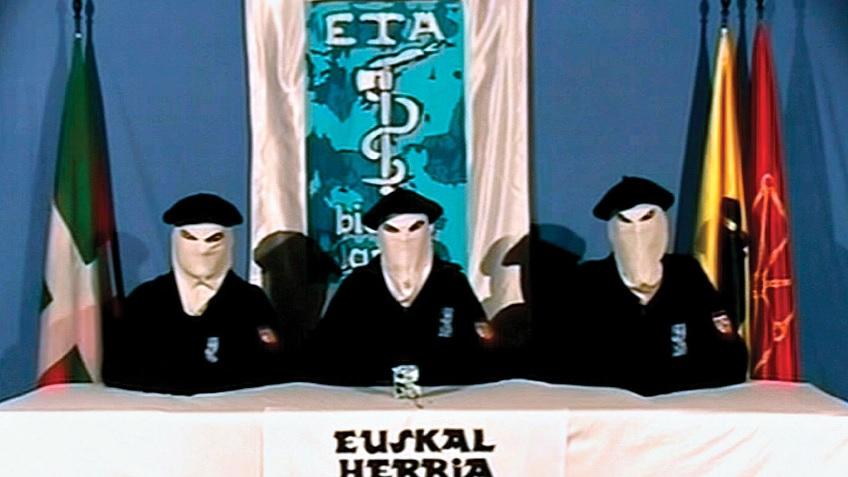
Jar gaitezen 2025erako proposamen politiko gisa, Espainiako Auzitegi Kolonialaren (AN) epai guztiak berrikusten hasteko eta makila bakoitzak bere belari eusteko.
Unionismoarekin lerrokatutako alderdi, sindikatu eta gizarte-erakunde gehienek, eta ez bakarrik horrela... [+]
Next Saturday, 11 January, the Sare citizens' network called for a new demonstration in Bilbao in defence of the rights of Basque prisoners. This is a unique opportunity to move forward on the path of coexistence in our people, after decades of violent confrontation and, even... [+]
Hatortxu Rock jaialdiko 29. edizioa egingo da larunbatean Atarrabian. Sarrerak jada agortuta daude, baina txandak osatzeko laguntza behar da oraindik.
I have recently had the opportunity to see the latest work by Pierre Carles, a committed documentary author. Under the name of Guérilla des FARC, l'avenir a une histoire (FARC guerrilla, the future has history), proposes a renewed account of the armed conflict that has lasted... [+]
What surprised you the most when you left jail? I've been asked many times in the last year and a half.
See that the streets of Bilbao are full of tourists and dogs with two legs, for example? Or the changes in the political situation? The first one has tired me and annoyed me... [+]












